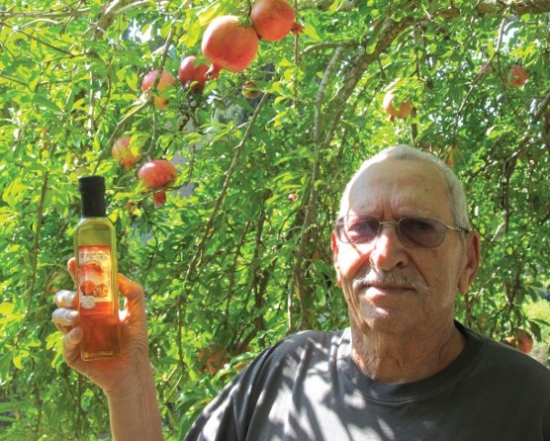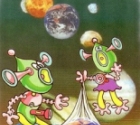
Kibbutz wine maker Micha Linn, 86, with pomegranate fruits and one of his much sought after liqueurs.
Photo: By Lydia Aisenberg
The mandrake, once known for its aphrodisiac and fertility qualities, is also coined the love plant, Satan's apples or devil's testicles.
For the past 15 years, octogenarian Micha Linn has been producing much sought after liqueurs from the abundant fruit that can be found throughout his Jezreel Valley kibbutz. In a relatively small winery, the 86-year-old son of Polish pioneers who founded Kibbutz Mishmar HaEmek, on the slopes of the Menashe Hills, produces wines and liqueurs from pomegranates, sabras, figs, dates, lemons -- and, of all things, mandrakes.
“Pomegranates (rimonim in Hebrew) are mentioned frequently in the Bible," says Micha, who is also an accomplished archeologist. "They were among the fruits the scouts brought to Moses to show that the Promised Land was fertile and able to provide for his people. The pomegranate motif is found in many of the carvings in stone from the Biblical period and featured greatly in mosaics and was embroidered on clothes and fashioned in jewelry pieces, and the pomegranate also appears on ancient coins."
“The pomegranate has a huge number of seeds and symbolizes fruitfulness, and it is purported to have 613 seeds, fitting in nicely with the 613 mitzvot. I can’t say that I have ever attempted to count the seeds, mind you,” he adds, with a broad smile.
Pomegranate juice is known to be helpful in fighting a number of health problems, but on the other hand the fruit contains a high number of calories from natural sugars. It is the subject of ongoing scientific research.
Another fruit that is much more of a double-edged sword is the mandrake. Micha has been making mandrake liqueur since he began his hobby – which has developed into far more over the last decade – in 1997. In the beginning he collected the mandrake fruit from wild mandrakes found in the extensive forest (partly planted by his pioneering parents 90 years ago) behind Mishmar HaEmek. In recent years, he has grown his own mandrake plants in rows of enormous earth-filled barrels. “At my age I had to think about the bending down bit, so I brought them up to waist level,” he says.
The mandrake has long been known for its aphrodisiac, hallucinogenic and purportedly magical properties, and the fruit is of great interest to scientists. A group of professors from the universities of St. Louis and Haifa have been working closely with Micha to study the mandrake, but have not yet published any results.
“We believe that this highly aromatic plant has aphrodisiac and fertility qualities, and although in modern times there is difficulty in scientifically proving this, in Biblical times they had no doubt about it,” says Micha. “The mandrake is also known as the ‘love plant’ and is thought not only to help boost the male sperm count but also to help barren women become pregnant.”
“In Biblical times, when Jacob's wife Rachel was childless, the mandrake came to the rescue – at least that is what is written," says Micha. "In the Book of Genesis, Reuven, the eldest son of Jacob and Leah, finds some mandrakes, and Rachel, his mother's sister who is also married to Jacob, takes a fancy to the fruit and barters with her sister Leah for them. Rachel offers Leah a night in Jacob's bed that should have been hers, and soon afterward the barren Rachel, who had in the meantime consumed the mandrakes, became pregnant with Joseph. Leah, satisfied with the exchange of fruits of her son's labors, also apparently announced rather smugly to Jacob, 'I hired you with mandrakes.'"
Ancient Arabs called the mandrake fruit 'Satan's apples' or 'Devil's testicles,' and even the most famous bard of all, William Shakespeare, wrote of its magical properties. In more modern times, the young wizard Harry Potter encounters mandrakes in the garden of the Hogwarts magical school.
The mandrake is used by herbalists and homeopaths as a remedy for infertility and is recommended as a natural aphrodisiac. In France and Spain, peasant farmers are known to hang dried mandrake roots on barn doors to ensure the fertility of their sheep and goats.
Making wine and liqueur from mandrake fruit is not for amateurs. The walls of Micha Linn’s winery are covered in certificates from the Israeli Health Ministry and the Israeli Wine Institute that recognize his wines and liqueurs - except for those produced from mandrakes (dudaim in Hebrew).
“With all its good qualities, the mandrake is also highly poisonous as the seeds contain scopolamine – also known as the truth drug – and others. You really need to know what you are doing, and I use a machine and extra-fine sieves that would be impossible for a seed to get through, but even so the Ministry of Health is hesitant to recognize this. They seem to be afraid that I will poison the whole country with my mandrake liqueur!” says Micha with a wry smile.
Nov. 2013 - Lydia's comment:
I have spoken with Micha. He doesn’t know of anywhere – here or abroad – where one can buy the mandrake liqueur.
He is also no longer growing the mandrake plants for this purpose as he is nearly 80 and finds taking care of them physically beyond his capabilities.
 That Certain Smile
That Certain Smile Fay Shelter 1919-2012
Fay Shelter 1919-2012 Doreen (Devorah) Goldberg 1924 – 2012
Doreen (Devorah) Goldberg 1924 – 2012-1516356428.jpg) Hand in Hand Food Pantry
Hand in Hand Food Pantry Forever Slim
Forever Slim Food Foolish
Food Foolish Lydia Aisenberg
Lydia Aisenberg